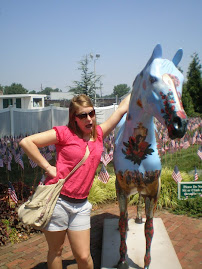If you know anything about me, you would know that I'm a developing feminist. You would know that I have a deep, passionate anger for sexual abuse of any time, but particularly the mistreatment/misogyny of women.
In the two years I've been at WKU, I've experienced a culmination of events that has led to my increasing interest in the treatment of Muslim women. The first semester of my junior year, I watched an author on campus who acted out a series of dialogues that pertained to Muslim women of all ages and backgrounds. Most of the dialogues dealt with abuse, victimization, and containment. I sat open-mouthed most of the night. Unbelievable.
But soon, of course, I didn't think much about it.
In the spring, I read a novel called "Minaret" by Leila Aboulela. This dealt with the social class system of a formerly-wealthy Muslim girl whose father was executed, mother eventually died, and brother turned to the streets of London for all the wrong reasons. She sank low into society, faced abuse, and became involved in a strange relationship. Religious confusion propels the honesty of the character and culture, and I somehow really bonded with this book.
Also in the spring, WKU hosted "The Vagina Monologues," which also featured a brief monologue of an older Muslim woman who had undergone genital mutiliation/"female circumcision". I was absolutely appalled and until now, I still didn't understand the full complexity of what horrors this women faced.
Now, I am reading "The Caged Virgin: An Emancipation Proclamation for Women and Islam," in which Ayaan Hirsi Ali proposes the Muslim women gain freedom on many different levels.
The scary part is that in some of the sentences and paragraphs, I felt completely intimate with the text--I felt that I could substitute "Islam" or "Muslims" for "Christian(s)" and the purpose was one in the same.
With my own (brief) history of sexual abuse, of course I have this sense of anger and passion, which I try to magnify and use to my own and others' advantages. I am thankful that I have never faced the magnitude that these women face every day--the claustrophobia of purpose, the misunderstanding of religion, the ostracism of expression, and the dead-weight of oppression. I have felt minutely victimized by these things on different occasions, but never so much as these women face.
I am currently working with Hope Harbor, a trauma center for victims of sexual abuse, to develop a creative writing program for creative and therapeutic expression. The process is still underway, and it may develop further when I'm gone for the summer, but how amazing would it be to organize something like this for Muslim women at rescue centers?
For my Lit Theory class, we're also reading "Reading Lolita in Tehran," which is a memoir as the Azar Nafisi reads Lolita, The Great Gatsby, Daisy Miller, and Pride and Prejudice. Nafisi organizes a reading group among Muslim women, who secretly gather at Nafisi's house out of fear of discovery.
Women are oppressed everywhere. This oppression obviously comes from many factors, but how sad is it that women are ostracized daily because of religion? It doesn't make sense! I've always know that there was this bitter bile inside of me that wanted to reject patriarchal nonsense, but I was taught to stifle most of it. I don't want to stifle it anymore.
Wednesday, March 31, 2010
Subscribe to:
Post Comments (Atom)





No comments:
Post a Comment